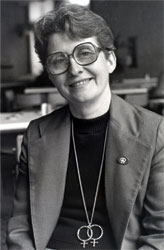 Reader At Large
Reader At Large
by Barbara Grier writing as “Gene Damon”
Photograph courtesy JEB[1]Barbara Grier image ©2017 by JEB (Joan E. Biren.) Used by permission.
Printed in the February 1966 issue of Tangents
pp. 23–26
Rueben, Reuben, begins the old song, a witty, dirty ditty, and that much describes Peter De Vries’ delightful book (Little Brown, 1964, Bantam. 1965).
There are only a few references to the actual homosexual and lesbian members of the cast, but the overall tone of let’s laugh at all of humanity’s foibles will capture any reader. One of the three major protagonists, Alvin Mopworth, has an undeserved reputation as a homosexual and over a third of the book is devoted to this endlessly workable, hilarious premise.
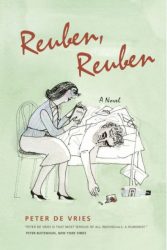 That Mopworth rally likes girls so violently has led to his reputation as a homosexual fighting the urge. When you consider that to portray a man as very clean, neat, personable and pleasant is often used as a stereotype for homosexual leanings, it would seem to follow that to be properly heterosexual one must be like the second major character in this book, the poet McGland, a dirty, humorous, lecherous and drunken Welsh poet who looks like a grizzly bear and (mentally) rapes every woman in sight. McGland and his wife are quite clearly based on an ill-starred famous contemporary poet and his wife. The narrator of Reuben, Reuben, Spofford, is a New England native, half Mark Twain and half Satan. Spofford first greets us gazing out the window at a new church “so modern they’re considering making divorce a sacrament.” De Vries deplores our excesses, but he loves people, and in his satirical way that message comes through loud and clear.
That Mopworth rally likes girls so violently has led to his reputation as a homosexual fighting the urge. When you consider that to portray a man as very clean, neat, personable and pleasant is often used as a stereotype for homosexual leanings, it would seem to follow that to be properly heterosexual one must be like the second major character in this book, the poet McGland, a dirty, humorous, lecherous and drunken Welsh poet who looks like a grizzly bear and (mentally) rapes every woman in sight. McGland and his wife are quite clearly based on an ill-starred famous contemporary poet and his wife. The narrator of Reuben, Reuben, Spofford, is a New England native, half Mark Twain and half Satan. Spofford first greets us gazing out the window at a new church “so modern they’re considering making divorce a sacrament.” De Vries deplores our excesses, but he loves people, and in his satirical way that message comes through loud and clear.
You can still pick up Larry Adler’s 1963 book, Jokes and How To Tell Them, published by Doubleday. This has several homosexual stories which require wit rather than sex for their points.
Fringe fiction often is too esoteric but “Tilt,” a short novel by Richard McBride, in his two-novel collection, Lonely The Autumn Bird (Denver, Alan Swallow, 1963), is more than worth the $1.65 price. It is a formless story set in the gutters of a nameless city. The surprise is in the careful inclusion of every possible homosexual passion without any vulgarity or obvious levers, from the swishy boys and screaming queens to the sober, settled boy and the older man who has been the route and offers a helping hand. There is Big Boy, the frustrated he-man who lives each day to find a queen to beat up and sometimes visits the local whorehouse for “special treatments.” He is asked: “I don’t see why you don’t get a fairy if this is all you want.” Wandering through the streets preaching love from a mind gone away in horror, Brain-Sick Brown dies struck by lightning:
In the instant before he falls he is lighted up as if he were a picture on the face of a violated slot machine: TILT TILT TILT.
Many, too many, novels are written about boys’ schools. William Wood’s 1960 novel, The Fit (Macmillan), is surely one of the finer examples. Mr. Wood uses multiple viewpoints to tell of the mental breakdown of awkward lonely Willard; each character supplies his part(or imagined part) in the events which push Willard over the edge. One is Gunny Jaines whose friend (and enemy) Al Kascher, has brutalized Willard. Al and Gunny take a trip to Boston, after Willard’s breakdown, where they quarrel because Gunny cannot take Al’s basic ugliness.
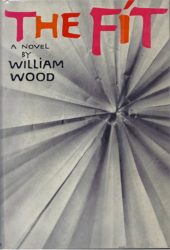 The focal point of the quarrel is a pair of gay boys “plainly very much in love.” Al wants to beat them up, but Gunny rebels, at once sadder and wiser. Mathematics tutor, George Turley, has been in love with Willard but has said and done nothing about it. His agonized wondering afterwards whether his declaration of love might not have saved the boy is very poignant. Mo Slater, primary protagonist and roommate of Willard, is definitely heterosexual and, in most ways, so is Willard, but it is their close relationship which holds Willard together for the better part of two years prior to the breakdown. Ironically, it is the end of that relationship which actually tips Willard over the brink of sanity.
The focal point of the quarrel is a pair of gay boys “plainly very much in love.” Al wants to beat them up, but Gunny rebels, at once sadder and wiser. Mathematics tutor, George Turley, has been in love with Willard but has said and done nothing about it. His agonized wondering afterwards whether his declaration of love might not have saved the boy is very poignant. Mo Slater, primary protagonist and roommate of Willard, is definitely heterosexual and, in most ways, so is Willard, but it is their close relationship which holds Willard together for the better part of two years prior to the breakdown. Ironically, it is the end of that relationship which actually tips Willard over the brink of sanity.
A little more of that invasion of privacy we are now beginning to take for granted in this country is explored in The Case Against Colonel Sutton, by Bruce Cameron (Coward-McCann, 1961, Paperback Library, 1964). Lt. Col. David Sutton, on the morning of his elopement with a general’s daughter is “semi-arrested,” his assignment is altered and he is subjected to an intense investigation by the Army’s leading “queer hunter,” Special Agent Larry Adams.
Clearly Colonel Sutton is guilty—he has, for example, long slender manicured articulate hands; he has a long-standing friendship with a world renowned French artist who is an admitted homosexual; he has an uncle who is also an artist and gay; he is unmarried and he paints in his spare time. A woman he has refused to sleep with, out of respect for her husband, adds her lies to the pile; simply to be vindictive.
A childhood “exploration” is pulled out and presented to him like a hot chestnut from his past. He helps damn himself by admitting that he doesn’t care whether people are homosexual or heterosexual. One humiliating interview follows another, and along side we are treated to the life of Larry Adams. His marriage has failed and his wife has written in one letter:
If only you could see and understand…but you go through life denouncing everybody as being weak except yourself. Oh, Larry, if only once you would have come home and said, “Today I had to do a thing I didn’t want to do, I had to hurt somebody.” Instead of announcing with pride, “Today I got another queer.”
The Colonel is vindicated but resigns in disgust. He does find someone to love him, and that is some compensation. Larry Adams finds a woman too—a French prostitute willing to supply his needs. She has boyish hips and suddenly in the night (for he cannot make love if there is any light) he cries out: “Frank—more Frank.” We can hope the casual reader gets the point.
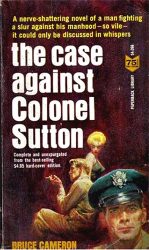 The second appearance of Julian Mitchell, whose Imaginary Toys (London, New Authors, 1961) was an important major treatment of homosexuality, is a superior novel and contains a charming and reprehensible homosexual (or bisexual) character with sufficient personal fascination to make the book a must.
The second appearance of Julian Mitchell, whose Imaginary Toys (London, New Authors, 1961) was an important major treatment of homosexuality, is a superior novel and contains a charming and reprehensible homosexual (or bisexual) character with sufficient personal fascination to make the book a must.
A Disturbing Influence in the community of Cartersfield is David Mander, nephew of the little town’s vicar. However, before we are introduced to David in this novel published in London by Hutchinson in 1962, and reprinted as an English paperback (London, Panther Books, 1963), we meet many of the people of Cartersfield, each in an individual chapter. Many of these are soon to fall victim to David: the English girl of good family whom he is able, literally, to “make her sweat” while copulating; the young men of the town who fall at his feet—he teaches them to drink, to vandalize and several other interesting truancies.
At times one wonders if the author is poking fun at himself since some of the symbolism is wryly hilarious. For example: David is careful to cover his genitals after making love to one of the female members of the cast. Later though, when the girl’s brother sees David undressed before swimming he nearly loses his mind with desire. The reader is left wondering just what David is endowed with beyond normal expectations. Of course, David is deliberately drawn as being almost supernatural. Such people are very desirable, at least in books. Mr. Mitchell’s trump card, though, is that David is never made to pay for his wrong doing. He gets away free and clear leaving something of a moral shambles in the little town—a good and very creditable book.
Stephen Birmingham’s novel, The Towers of Love (Little, Brown, 1961), includes a minor portrait of an interior decorator, Titi, and his lover, Waldo. The book is quite entertaining, but the coverage is slight.
The Sex Diary of Gerard Sorme, by Colin Wilson (Dial, 1963, Pocket Books, 1964), lives boringly up to its title (there is, after all, just so much mileage one can get out of bet room scenes). Toward the end of the book, just when the reader has lost all patience, Mr. Wilson introduces a madman patterned on Aleister Crowley which livens the book a little. Ok, but it’s easily skipped.
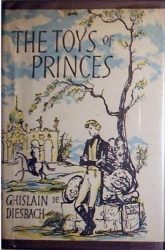 From the frivolous world of Ghislain de Diesbach comes a delightful collection of short stories, The Toys of Princes (Pantheon, 1962). The stories lie somewhere in that shadow land of mirth and madness inhabited by Isak Dinesen and Ronald Firbank. Many have gay flavoring and three: “The Margravine’s Page,” “The Chevalier d’Armel’s Wedding,” and “Of Love and Money” are wholly pertinent. Caviar, for the few.
From the frivolous world of Ghislain de Diesbach comes a delightful collection of short stories, The Toys of Princes (Pantheon, 1962). The stories lie somewhere in that shadow land of mirth and madness inhabited by Isak Dinesen and Ronald Firbank. Many have gay flavoring and three: “The Margravine’s Page,” “The Chevalier d’Armel’s Wedding,” and “Of Love and Money” are wholly pertinent. Caviar, for the few.
One of the vignettes which make up Captain Newman, M.D., by Leo Rosten (Harper, 1961, Fawcett Crest, 1963), is a rather sad, wholly clinical, homosexual portrait. Rosten is recommended, in general, for his humor and warmth.
The Devil’s Profession is of course, acting, and author Russell O’Neil has acted, which accounts for the authentic tone of this novel published by Simon and Schuster (1963, 1964). Buck Tone, narcissistic, masturbating juvenile is picked up by Archer Gordon, a famous agent. Archer introduces Buck to his bedroom and tries to introduce a little polish as well, which doesn’t adhere to the elephant-hided boy. Archer comes to regret his choice, but this is expected. The author, for a change, presents in Archer a homosexual as a wholly respectable and highly respected man. Good.
Presumably everyone has heard of the major poetic homosexual novel, The Eye and The Heart, by Carlo Coccioli, published in London by Heinemann in 1960. However, some may not know that British Book Service distributed copies in the United States, and many libraries now own it. Have your local library request it by inter-library loan, if necessary.
—GENE DAMON
Image: Barbara Grier, c. 1972, by JEB. Courtesy of the San Francisco Public Library
Content ©1966, 2016 by The Tangent Group. All rights are reserved.

